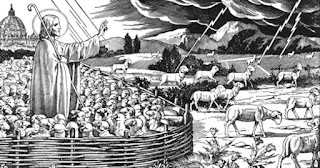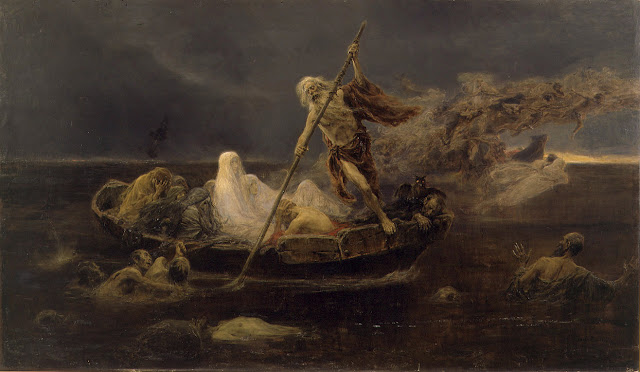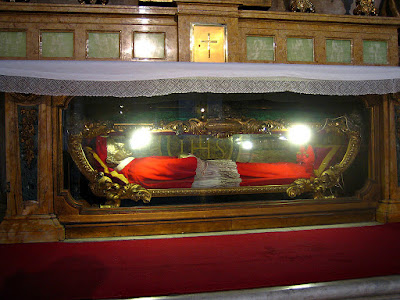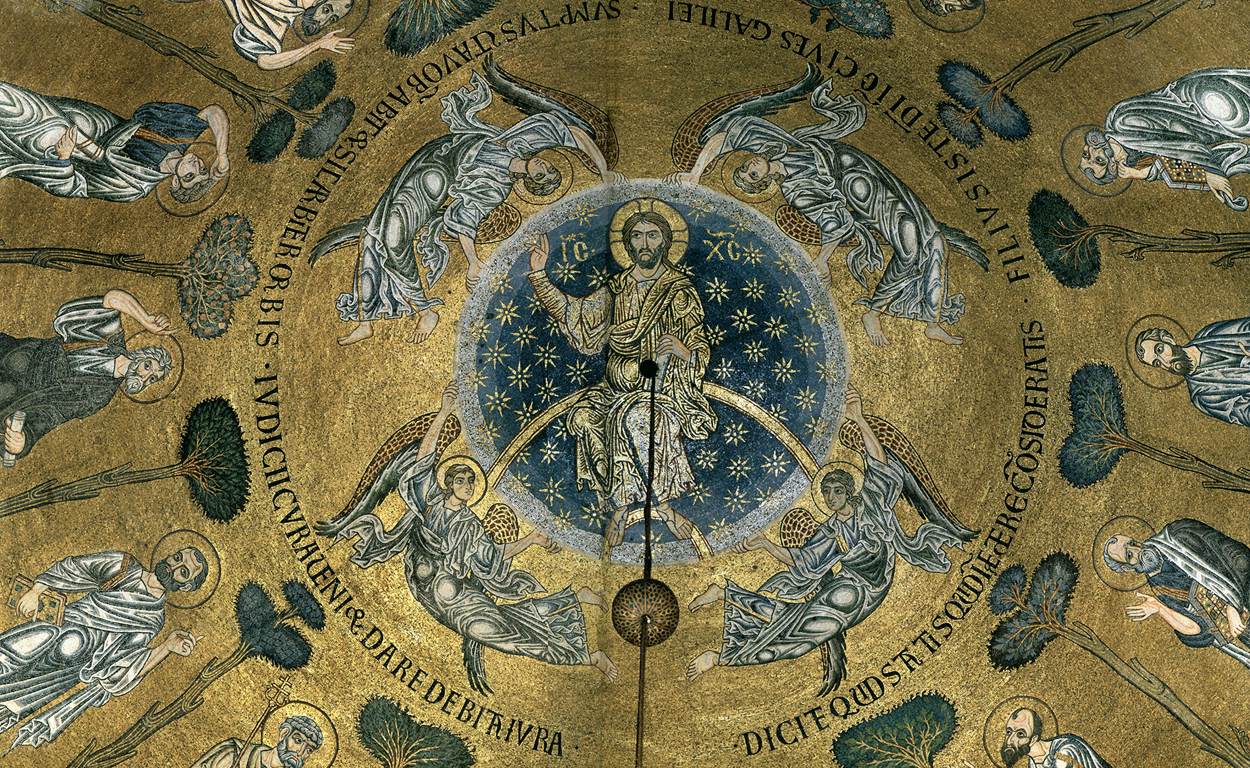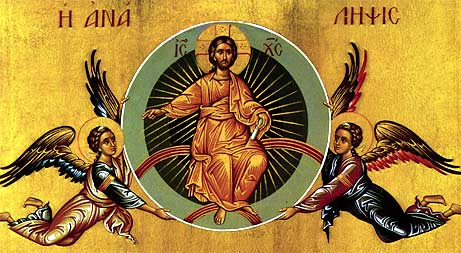A correspondent wrote to me confessing a slight faintness with the gravity of Catholic teaching on the Eucharist, that Christ is not merely present in a spiritual sense after Anglo-Catholic fashion, but is really present in His Flesh on the altar:
Verbum caro, panem verumverbo carnem efficit:fitque sanguis Christi merum,et si sensus deficit,ad firmandum cor sincerumsola fides sufficit.The choice of the word "flesh" comes to us from Holy Writ, not handmedown concepts of oblation inherited from Roman paganism or Judaic sacrifice. "Unless you eat the flesh of the Son of Man and drink His blood," Our Lord teaches, "you shall not have life within you" (John 6:54). A spiritual presence straddles a fine boundary between mystical and symbolic. A fleshly presence accepts a spiritual presence while adding a more immediate one to it. The Eucharist must be a physical and spiritual reality precisely because the Church is both a physical and spiritual reality, as a remarkably long and un-monitored comment box on EENS demonstrates. The Church is not bound by the sharing of the Eucharist among its numbered members, but in Christ absorbing the faithful into Himself by giving His flesh over to them ut unum sint. St. John Chrysostom says as much during Mattins for Saturday within the octave:
"Dearly beloved brethren, it behoveth us to learn the miracle of the Mysteries what the Gift is, and why It was given, and what is the use thereof. "We, being many, are one body," saith [the Apostle Paul, 1 Cor. x. 17, and again] "We are members of His Body, of His Flesh, and of His Bones." Eph. v. 30.Only the initiated will now understand what I say. That this union may take place, not by love only, but verily and indeed, we ought to mingle our own with His Flesh. And this is done by eating that Food Which He hath given unto us, being fain to manifest that exceeding great love which He beareth to us-ward. To this end He hath mingled Himself with us, and infused His Body into our bodies, that we may be one together, like as the limbs of a man and his head are all of one body. Such union do they long for that love much."The Archbishop of Constantinople continues in Monday's Mattins:
"In this mysterious Sacrament Christ doth mingle Himself with all and each of His faithful ones. They are His children, and He nurseth them Himself, and giveth them not over unto another, herein again assuring us that the Flesh He hath taken unto Himself is ours. We then, who have been deemed meet to be treated with such love and such honour, let us be wakeful See ye not how eagerly the sucklings seize on the breasts, how readily they fix their mouths on the paps Let us, with like eagerness, draw nigh to that Table, and suck at that spiritual Cup. Yea, let us prize that gracious Food as the suckling doth its mother's breast, and hold it the great woe of life to be cut off from that Banquet. Here there are set before us no works of man's power He That worked at that Last Supper, the Same worketh the same here still. As for us Priests, we hold the place of His ministers, but He Which halloweth and changeth is He. Hither let there draw nigh no Judas, nor covetous one this is no Table for him. But he which is Christ's disciple, let him come for the Lord saith "I will keep the Passover with My disciples," Matth. xxvi. 18. This is that Passover Table, and it is all Christ's what is wrought there is not some of it Christ's work, and some of it man's work, but it is all His work and not another's."The eagerness of the faithful to "suck at that spiritual Cup" is obscured on our reformed 20th century rites. With very few exceptions anyone who attended a Latin rite parish today experienced an "external solemnity" of Corpus Christi Thursday Sunday. This is unfortunate and a consequence of the reduction of octaves under Pius XII and the availability of celebrating major feasts in place of the Sunday Mass. In the traditional Roman rite today would have been the Second Sunday after Pentecost, Sunday within the octave, complete with white vestments, commemorations at Mass and the office, and the preface of the Incarnation during the Mass. The gospel passage comes from Luke chapter 14, in which Our Lord makes a parable of a rich man who holds a banquet only to find that all the invited guests have made their polite excuses. The rich man then tells his servants to go into the streets and invite everyone they can find to the banquet. The Sacrament of the Lord, the glue of the Church, is open to all who do not reject it. The Jewish people were granted the revelation of God to man ("Salvation is from the Jews" John 4:22) and the unique place of being His "people" in the world; in declining Christ, to Whom the fullness of revelation was offered in Christ, the faith was then opened to the entirety of the world. The Temple sacrifices besought the forgiveness of the sins of the Jewish people and bound them under God's command. The Memoriale mortis Domini actually accomplishes the forgiveness of sins within the Church and binds the Church visibly under the Son of Man's own flesh.
Sunday Gospel as an antiphon
The feast of Corpus Christi is quintessentially Roman in its texts, direct yet with heuristic, subtle wordplay from St. Thomas Aquinas. The fleshly presence of Christ in the Eucharist finds itself expressed in many texts and actions throughout Eastern and Western liturgical history; long before monstrances the Sacrament was carried in a pyx by the celebrant and heralded by boys dressed in sack cloth as "prophets" in the Sarum form of Palm Sunday. The Sacrament extends Christ's presence on earth without dividing Him.
And yet there is an odd extension of Eucharistic piety that personifies the Sacrament to a level that the Church has never traditionally understood. There have been some pious additions in Eucharistic devotion in the Latin Church that frankly give not a few of us the "heebie jeebies." I recall one fine Sunday morning breaking the fast at Brown's on Woodstock after the 8AM Mass at the Oxford Oratory. A gathering of us discussed the long road ahead to getting the old liturgy a permanent foothold in the mainstream Church. One of our number commented that one difficulty was the odd focus on the Blessed Sacrament itself outside of the liturgy, which distracts from the fact that the liturgy exists to confect the Sacrament. "What, pray tell, do you mean?" I asked. "Well, Rad Trad," he dilated, "I recently ran into a friend on his way to the Oxford chaplaincy to pay a 'visit' to the Sacrament. All well and fine to me, but when I asked why he did not just pop into the Oratory or Blackfriars, nearer his college, he gave me a queer reply. Do you know what he said? 'He's lonely.' Well, of course He's 'lonely'! He's God! He's the Only One!"
A blessed continued octave of the Body of the Lord to all!


